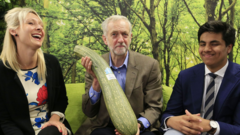Is Corbyn Right to Criticize Rayner for Allotment Sales?

Understanding the Controversy Over Allotment Sales in the UK
The recent dispute between Jeremy Corbyn and Angela Rayner over the sale of allotments has brought the importance of these green spaces to the forefront of public conversation. With the backdrop of the UK's growing housing demand, the decision to sell allotments has raised eyebrows and ignited a passionate debate about land use, community values, and the historical significance of allotments in the UK. The critical issue here is not just about land but about preserving a vital resource that many communities rely on for food and recreation.
The Historical Context of Allotments
Allotments in the UK have a rich history. They began as a response to the Enclosure Acts of the 18th and 19th centuries, which transformed common land into private property. This transformation marginalized the rural poor, forcing many into cities where they faced starvation and poverty. The Diggers, a group during the English Civil War, fought for access to common land, highlighting the need for equitable land use. Jeremy Corbyn’s deep understanding of this history positions him as a passionate advocate for allotments, linking their existence to social justice and community rights.
The Current Allotment Landscape in the UK
Today, the situation surrounding allotments is critical. According to the National Allotment Association, approximately one in eight people in the UK does not have access to a garden, with this figure escalating to one in five in urban areas like London. The waiting lists for allotments are staggering, with around 100,000 individuals currently seeking a plot, some waiting for decades. This scarcity emphasizes the importance of preserving existing allotments against development pressures.
Why Are Allotments Under Threat?
As urbanization continues to expand, the demand for housing has led to an increased interest in land that was previously designated for community use, including allotments. The recent decision by Angela Rayner to approve the sale of eight allotments across various councils has sparked controversy. Critics argue that this move threatens the future of these essential green spaces, which serve not only as sources of food but also as community hubs for gardening enthusiasts.
The Role of Government in Allotment Sales
Government regulations stipulate that allotment sales can only occur under strict criteria, which include the necessity of the sale and its value for money. However, the criteria have been criticized as being too lenient, allowing councils to prioritize housing development over community access to green spaces. This has raised concerns about the long-term implications for urban communities, where access to nature and gardening can significantly enhance quality of life.
Community Response to Allotment Sales
The response from community members and local leaders has been overwhelmingly in favor of protecting allotments. Many argue that while housing is indeed a pressing need, it should not come at the expense of community gardens and allotments. Activists suggest alternatives, such as utilizing brownfield sites or repurposing vacant buildings to address housing shortages without sacrificing green spaces.
The Allotment as a Community Resource
Allotments are more than just patches of land; they represent a lifestyle choice and a form of resistance against urbanization. For many, tending to an allotment provides mental health benefits, fosters community connections, and promotes sustainable living. The act of growing food, whether it’s potatoes or marrows, connects individuals to their environment and to each other, cultivating a sense of belonging and purpose.
Environmental and Health Benefits of Allotments
Allotments contribute significantly to local biodiversity and environmental sustainability. They offer habitats for various species, help in carbon sequestration, and promote organic gardening practices. Furthermore, growing one’s own food can lead to healthier eating habits and reduced reliance on store-bought produce, which is often packaged and transported over long distances.
Looking Forward: The Future of Allotments
The debate surrounding allotment sales highlights the need for a balanced approach to urban planning. As cities continue to grow, it is crucial that they incorporate green spaces into their development plans. Policymakers must recognize the value of allotments not just as a source of food but as essential community assets that enhance urban living.
Potential Solutions for Allotment Preservation
Several strategies could be implemented to ensure the protection of allotments while also addressing housing shortages. These include:
- Stricter Regulations: Enforcing more stringent criteria for allotment sales can help protect these spaces from being sacrificed for development.
- Community Engagement: Involving local communities in decision-making processes regarding land use can lead to more equitable outcomes.
- Utilizing Alternative Land: Identifying brownfield sites or vacant properties for housing development can reduce pressure on allotments.
- Creating New Allotments: Local governments should explore opportunities to create new allotment spaces in urban areas.
Conclusion: The Importance of Allotments in Urban Life
The ongoing discussion about the future of allotments underscores their critical role in urban communities. As pressures for housing increase, it is imperative to advocate for the preservation of these valuable green spaces. The history of allotments as a means of resistance against enclosure and their ongoing importance in the lives of many individuals cannot be overstated. By working together, communities can ensure that the joy of digging in the ground for potatoes continues for generations to come.
FAQs About Allotments
What are allotments and why are they important?
Allotments are small plots of land rented by individuals or groups for the purpose of growing fruits, vegetables, and flowers. They are essential for community engagement, food production, and mental health.
How many people are currently waiting for allotments in the UK?
Approximately 100,000 people are on waiting lists for allotments in the UK, with some waiting years or even decades for a plot.
What can be done to protect allotments from development?
To protect allotments, stricter regulations on sales should be implemented, and communities should be engaged in the planning process. Alternatives such as developing brownfield sites should be prioritized.
As we reflect on the ongoing battle to preserve allotments, it’s crucial to consider how we prioritize green spaces in urban planning. What steps can we take to ensure that future generations can enjoy the simple pleasure of gardening? #Allotments #UrbanGardening #CommunityGreenSpaces
```Published: 2025-08-05 12:40:12 | Category: sport



